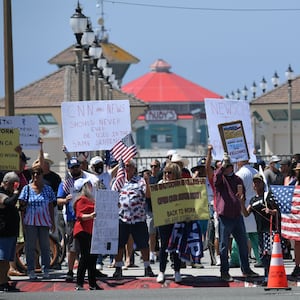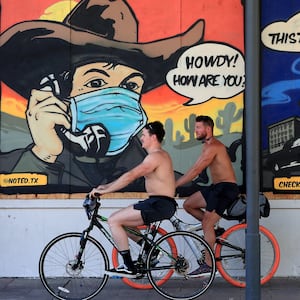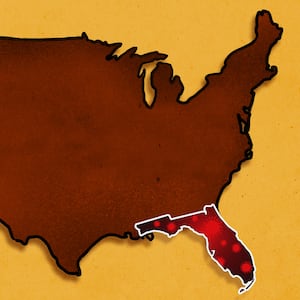With cases of the novel coronavirus spiking across the country—and smashing records—New York, New Jersey, and Connecticut on Wednesday took the major step of ordering a mandatory two-week quarantine for visitors from states with troublingly high rates of COVID-19.
The new order applies to travelers from nine states so far: Alabama, Arkansas, Arizona, Florida, North Carolina, South Carolina, Washington, Utah, and Texas. Visitors who refuse to self-isolate could be forced into a “mandatory quarantine” and fined, New York Gov. Andrew Cuomo warned.
In announcing the crackdown, Cuomo noted the “reality” that 27 states are seeing rising COVID-19 rates that could upend the economic and social sacrifices New Yorkers have made since March to save lives. The tables have turned significantly, as just months ago states like Arizona, Texas, and Florida enacted similar travel restrictions against visitors from New York.
“We’ve worked very hard to get the viral transmission rate down, and we don’t want to see it go up again because people are traveling into the state and bringing it with them,” Cuomo said in a Wednesday press conference.
States have used various strategies to enforce these quarantines and travel restrictions—from roadside checkpoints to recording contact information—but the question remains, how will the tri-state area enforce such an order, particularly in the largest city in the country, which is already home to more than 8 million Americans?
HOW IT WILL WORK
Details of how the advisory will be enforced are still vague, but officials in New York, New Jersey, and Connecticut have said each state will be individually responsible for enforcing the advisory.
In New York, the governor’s office told The Daily Beast that individuals will largely be trusted to self-isolate on their own, while noting that penalties for noncompliance include a $2,000 fine for the first violation, $5,000 for the second, and up to $10,000 if residents “cause harm.” Cuomo also said Thursday inspectors will perform “random checks” on travelers.
“You fly into New York, we’ll have your name, we’ll know where you’re supposed to be staying,” Cuomo said in a CNN interview, admitting there will likely be residents who slip through the cracks. “We’ll have inspectors who are randomly looking at names on the [flight lists] and following up to make sure you’re quarantining. And if you’re not, then you’re in violation of the law, and you will have a mandatory quarantine, and you’ll be fined.”
A spokesperson for the New York State Department of Health also confirmed to The Daily Beast that the state plans to check flight manifests and inform affected travelers they must quarantine. “Other enforcement measures could include highway checkpoints, violation fines, and people could also file complaints about those they believe to be violating the advisory,” he added.
All three states will get the message out at airports and on highways, websites, and social media and have asked hotels to communicate the quarantine to guests who have traveled from one of the “hot zone” states.
“I think we’d have an advisory that goes to every single person thinking about coming to a state like Connecticut or any of our tri-state region. They’d get a notice when they got off the airplane,” Connecticut Gov. Ned Lamont said Wednesday, noting that while the advisory is voluntary in his state, it is considered “urgent guidance.”
New Jersey Gov. Phil Murphy said the advisory applies to everyone, even residents returning home, and stressed officials are asking people “to take on a big amount of personal responsibility here, to do the right thing for themselves and for their families, communities, and the rest of us.”
When asked about the possibility of fines, Murphy did not go into detail, but noted that the state’s health commissioner “has within her powers to directly address an individual who is non-compliant.”
Karl E. Minges, a professor who serves as chairman of the Health Administration and Policy Department at the University of New Haven, has doubts about how successful these states will be at forcing visitors to stay inside.
“The policy itself is good on its face, but the implementation is going to be very challenging,” Minges said, stressing that the decision to have the travel advisory is beneficial and crucial to maintaining low numbers of cases in the three states. “People can get into the state through side roads, major highways, airports, and even boat travel. There are many ways into the state.”
Minges also noted that people can easily avoid these checkpoints and travel blockages, since there are so many means of transportation into the three states—and that there is no “feasible way to track who is coming and going.”
“This policy is asking people to make changes, to change their economic practices, and to impose self-imposed restraint. That’s a lot to ask,” he said. “The better way to go about this could be mandatory testing—to prove that you don’t have COVID-19 when you enter the airport or a road checkpoint.”
Even New Yorkers who fled the Empire State—and may be subject to the new quarantine upon their return—think at least attempting to crack down on out-of-state visitors is a smart strategy.
Several residents who left the Big Apple for Miami applauded the advisory, telling The Daily Beast it’s now all too clear Florida loosened virus restrictions too early—and now 20,000 people have tested positive over the last week alone. New York, on the other hand, saw only 3,200 new cases over that same time period.
“I’ve been in Florida for three months. When cases were piling up in New York City, I thought I was smart for fleeing my small Brooklyn apartment for my parents' house. Now, when New York City finally has their shit together and Florida is the one who messed up—big time—I wish I had stayed,” one woman told The Daily Beast, choosing to remain anonymous for fear of retaliation at her government job.
Another resident said that she was planning to self-isolate even before she heard about the state’s Wednesday announcement, since cases in Florida have had such an alarming spike.
HOW IT’S WORKED IN OTHER STATES
As the three states begin to implement the travel advisory, state officials may be looking at the success of quarantines in other states for guidance. In March, when cases first began to surge, researchers found that New York City had been seeding outbreaks around the country—prompting a strict lockdown in the state.
But as many New Yorkers fled, a handful of states began to require out-of-state travelers to quarantine upon arrival, while others just asked residents to limit their inter-state movements. Since March, Rhode Island has implemented checkpoints, where police have stopped motorists with out-of-state licenses to ask where they are going—a measure the Connecticut governor said Wednesday he’s trying to avoid.
By the end of March, Florida and Kansas began requiring travelers from the New York area to quarantine and other states sought to restrict new visitors.
Florida Gov. Ron DeSantis issued one of the most restrictive orders against incoming travelers—which has since been undermined by his decision to loosen virus restrictions while new cases are still surging in the state. His order required all airline passengers to fill out forms aboard their planes en route to the Sunshine State and talk to public health officials upon landing. The forms required travelers to provide their contact information—including the address of the place they were staying and their current health conditions.
With one of the strictest travel advisories in the country, Hawaii for months has required any visitors to the islands to quarantine for two weeks, regardless of the COVID-19 numbers in their home states. As of last week, the state is allowing travelers who test negative for the virus up to three days before their arrival to be exempt from the order. Maine, Vermont, and Arkansas have similar testing and quarantine requirements—varying from one to two weeks—for out-of-state vacationers from hot zones.
“A state should take appropriate actions to protect their citizens just like Arkansas did when we required quarantine from people coming from New York or New Jersey and Connecticut and New Orleans,” Dr. Jennifer Dillaha, state epidemiologist with the Arkansas Department of Health, told KATV on Thursday. “It’s important for us to realize that this will have an impact on our state, and we do not want to transport this infection to other states if we can avoid it, and obviously they don’t want it to happen either.”
Texas also instituted quarantines for travelers from 10 destinations, including New York, New Jersey, and Connecticut, in an advisory that expired on May 21. To enforce those rules, the state placed Texas Rangers at airports to question travelers from the 10 affected areas, according to a spokesperson for the Texas Department of Public Safety.
Despite the various travel advisories, airlines haven’t stopped ferrying travelers between states with restrictions. American Airlines told The Daily Beast that while “some states are placing new quarantine requirements for customers arriving from other locations,” they are not adjusting their flight schedule to adhere to these measures. Instead, they urge residents traveling domestically to be vigilant and check the requirements of the local governments they are traveling “to comply with any requirements upon their arrival.”
At the end of the day, the tri-state area seems to be banking on the idea that communication and accountability is enough to force visitors into isolation.
“I think most people are going to honor it. They understand why we’re doing this,” Cuomo said Thursday. “This is not a blockade. I don’t believe a blockade is legal. The federal government at one time threatened to blockade New York which means you couldn't come in, you couldn’t go out. I don’t believe that’s constitutional, but states do have the authority to regulate their own public health.”










